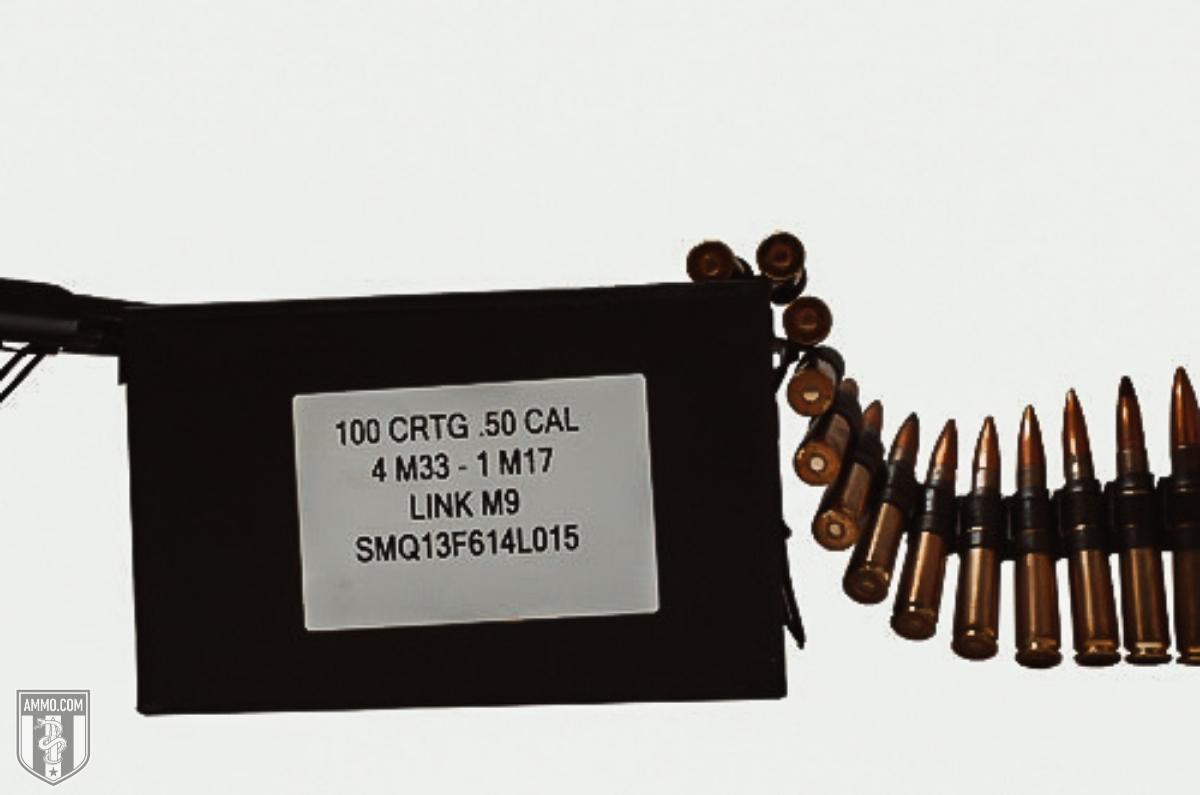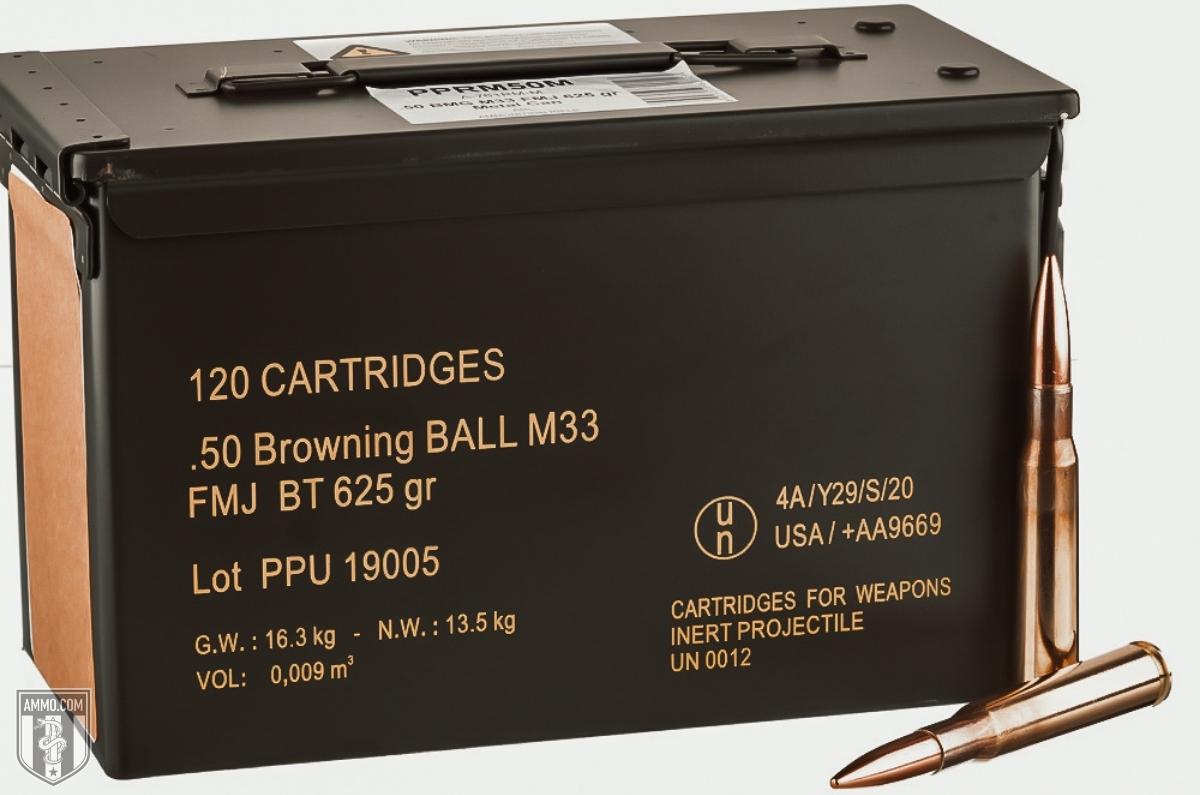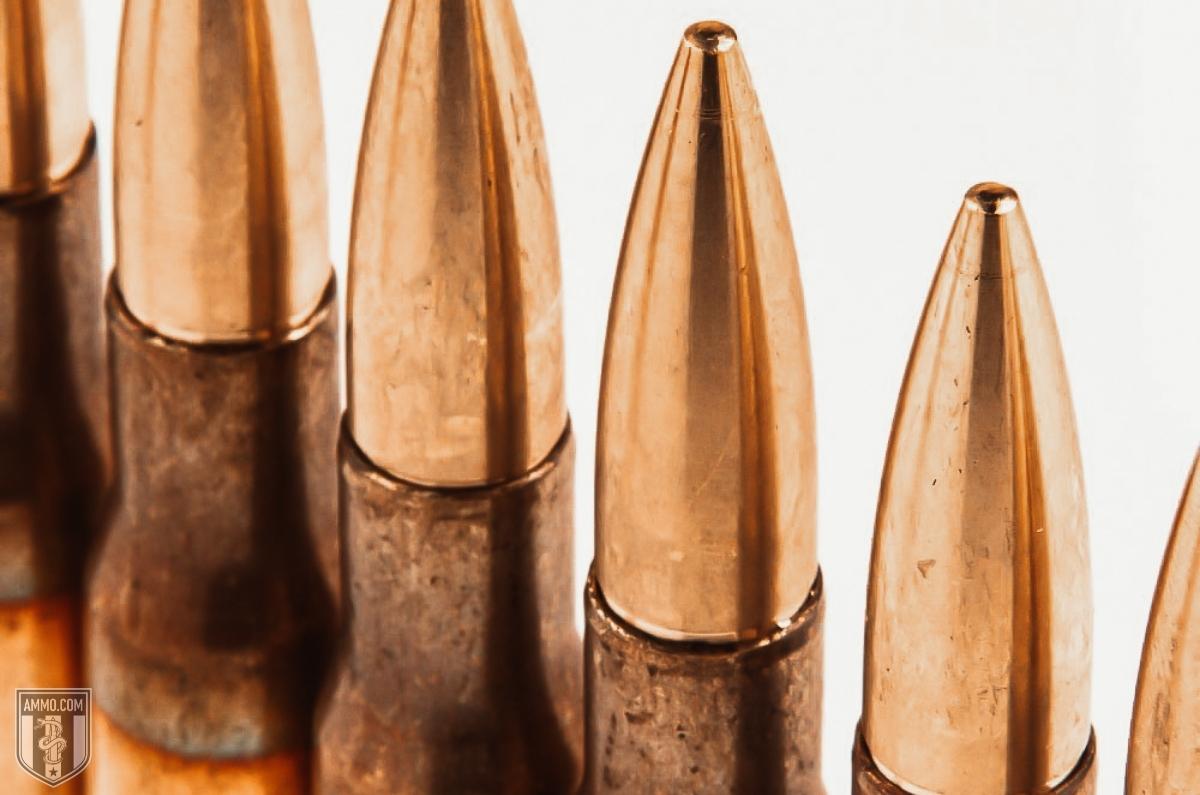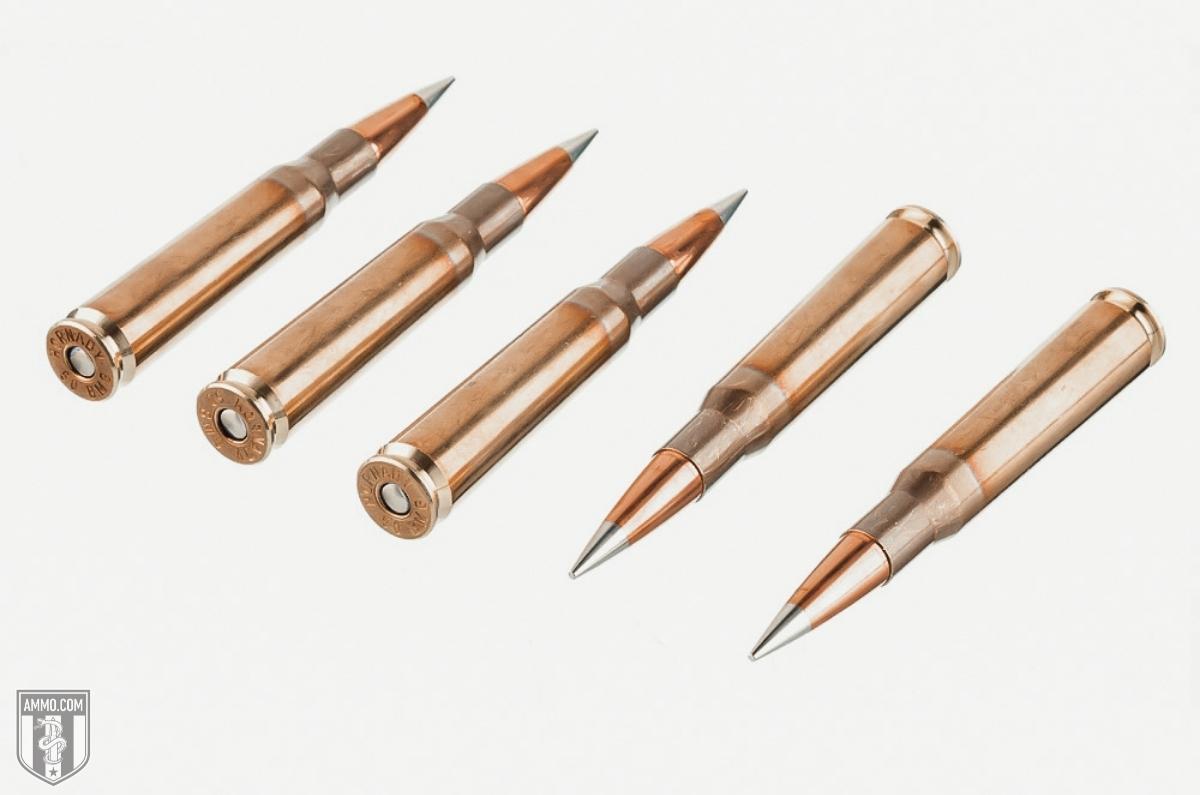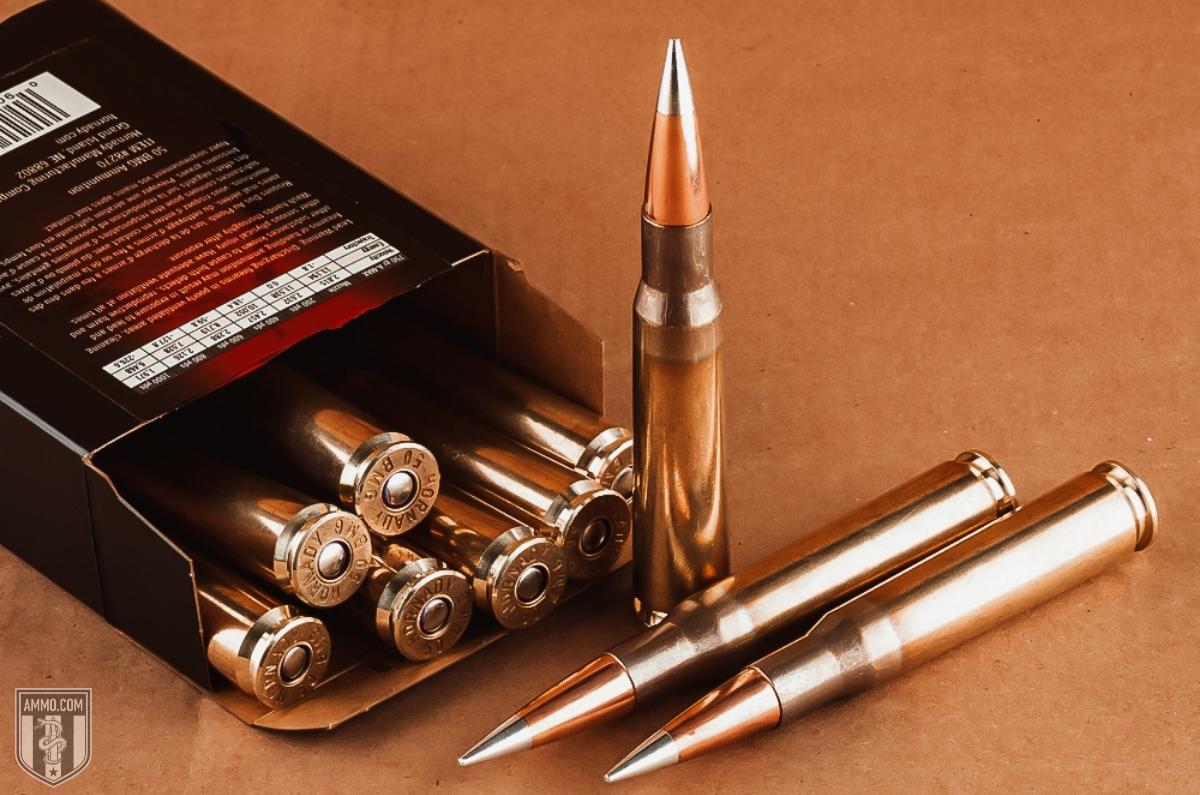50 Beowulf vs. 50 BMG: Not So Similar
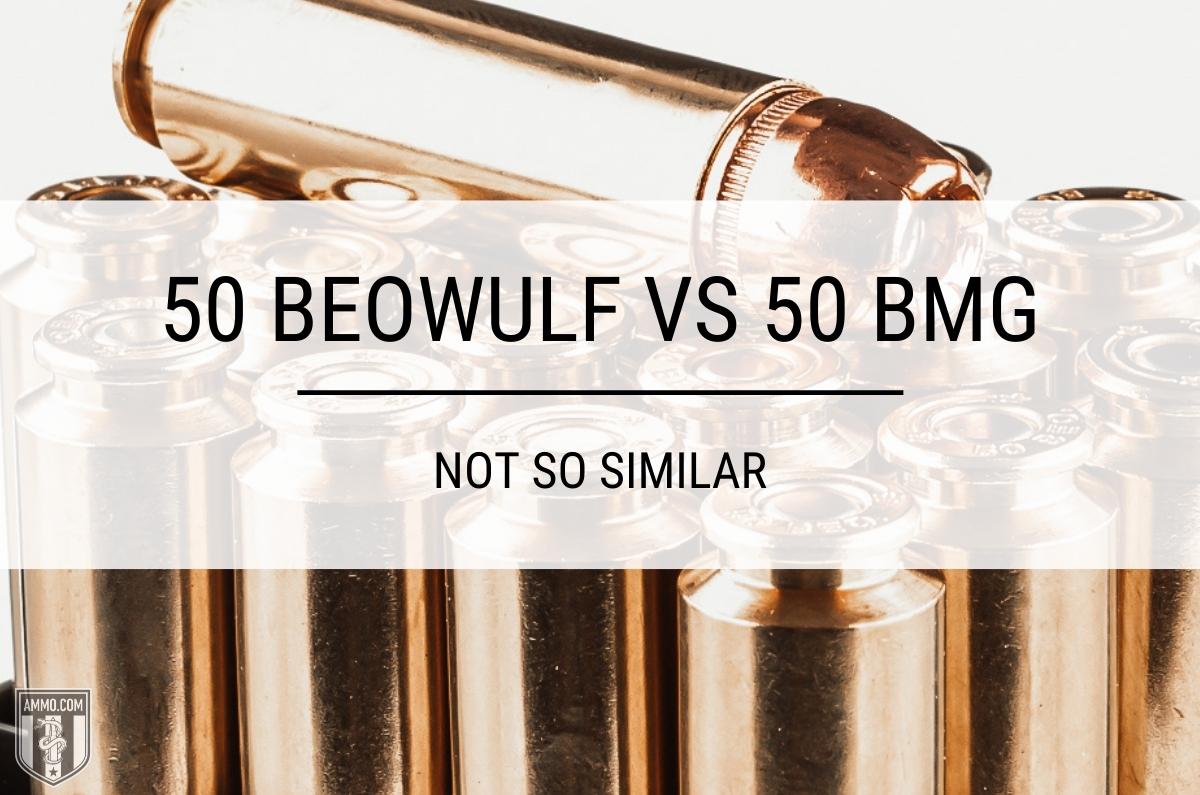
It's easy to see why someone would want to compare 50 Beowulf vs. 50 BMG. Each has "50" in its name, after all.
That's almost the only similarity these cartridges share, though. Their differences become apparent once you see the rounds side-by-side. There's no denying they were created for very different purposes.
By the end of this article, you'll understand the differences and minor similarities between these two rounds. There will be no snobby answers to simple, honest questions like "how big is a .50 caliber bullet."
50 Beowulf vs. 50 BMG
The 50 Beowulf was created as an alternative big-bore round for the AR-15. Although the 5.56 is an excellent cartridge, its kinetic energy comes nowhere near the 50 Beowulf's.
The 50 Browning Machine Gun (BMG) was created for the military as an armor-piercing round capable of disabling vehicles and aircraft from long range.
Since these rounds were created for very different purposes, we can expect very different specs and performance measurements for them.
Cartridge Specs
The 50 Beowulf maximum overall length is 2.125". The straight-walled case makes up 1.650" of the overall case length.
The 50 Beowulf fires a 0.500" diameter bullet, with bullet weights ranging between 200 and 600 grains; 335, 350, and 400 grain bullets are most common.
It has a rebated rim design, meaning its rim is narrower than its base. The 50 Beowulf has a rim diameter of 0.445".
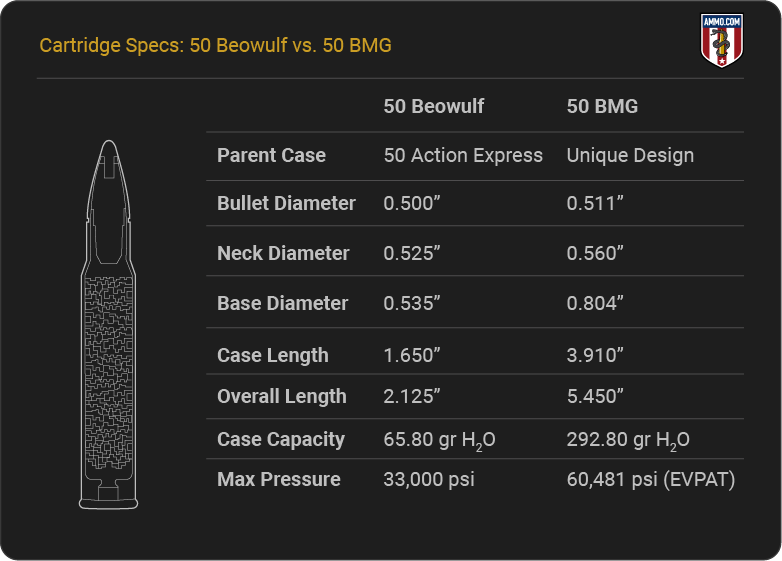
"50 Beowulf" is trademarked by Alexander Arms. To avoid trademark litigation, ammo manufacturers use the round's metric designation: 12.7x42mmRB.
The 50 Beowulf is not a SAAMI-certified cartridge.
The 5.450" long .50 BMG round is much larger than the 50 Beowulf. Its 3.910" bottleneck case is rimless, with a base diameter of 0.804".
The 50 BMG's bullet diameter is only slightly wider at 0.510". A standard 50 BMG cartridge fires a full metal jacket (FMJ) bullet weighing 647 grains – nearly double the mass of many 50 Beowulf bullets.
When these rounds are lying next to one another, their size difference will make it impossible to confuse one for the other.
50 BMG vs. 50 Beowulf: Recoil
Neither of these rounds is known for its light recoil. In fact, it's quite the opposite.
The 50 Beowulf is known as a "thumper round" because it has lots of recoil and hits hard.
Felt recoil is dependent on the shooter, shooting position, stance, and firearm. Free recoil, however, provides an objective measure of how hard a cartridge kicks. It is determined by bullet weight, rifle weight, muzzle velocity, and powder charge weight.
50 Beowulf cartridges have much less recoil than the .50 Browning: 29-32 foot-pounds (ft-lbs), which is about one-third of the larger round's 97 ft-lbs kick.
If recoil is your only concern, then the 50 Beowulf round is the only way to go.
Trajectory
Trajectory is a measure of how flat a round shoots. The flatter the trajectory, the more accurate the round can be, and the more forgiving it is of ranging mistakes.
Trajectory is determined by several factors, including bullet weight, shape, and the amount of powder in the case.
The trajectory of the 50 BMG dwarfs the 50 Beowulf's trajectory.
The 50 Beowulf has a maximum effective range of 150 yards. Beyond this distance, the round becomes subsonic and begins to drop quickly.
The 50 BMG has no problem accurately reaching 1,000 yards for competitive uses. It can effectively take out a human target at a mile or more for military use.
Even though the 50 Beowulf is loaded with a lighter bullet, the 50 BMG's stronger propellant charge and more aerodynamic .50 cal bullet give it a substantially flatter trajectory.
The winner of the trajectory category is the 50 BMG.
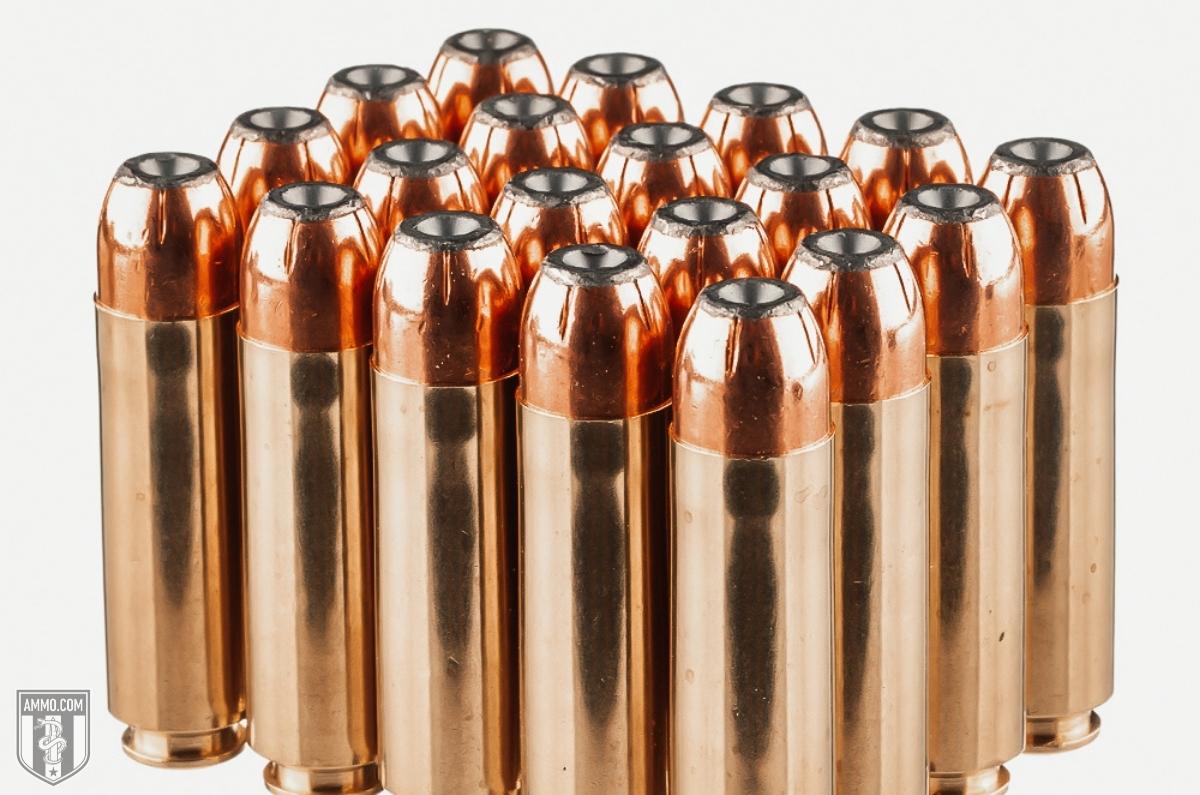
.50 Beowulf vs. .50 BMG: Accuracy
Neither round was designed to be a tack driver. However, the 50 BMG is more accurate at farther distances due to its flatter trajectory.
The top competitive shooters can get 6" groups at 1,000 yards, which is incredible.
At distances of 150 yards or closer, the 50 Beowulf is capable of being more accurate for the average shooter because of its lighter reduced recoil.
It's easier to be more accurate with the 50 Beowulf. It simply lacks the power to be accurate at longer distances.
In summary, the 50 Beowulf is more accurate within 150 yards; the 50 BMG trumps it at farther distances
Ballistic Coefficient
Ballistic coefficient (BC) reflects how aerodynamic a bullet is, as well as how well it resists wind drift.
A higher BC is better than a lower one. Longer and heavier bullets usually have higher BCs because they resist wind drift more efficiently.
The 50 Beowulf has a low BC (around 0.200) due to its short, thick bullet – a byproduct of design restrictions of the AR platform.
The ballistic coefficient of the Barrett 50 BMG bullet is 0.640. The 50 BMG's bullet length, shape, and weight all contribute to its much higher BC than the 50 Beowulf bullet.
The 50 BMG is the winner of this section.
.50 BMG vs. .50 Beowulf: Stopping Power
Sectional density (SD) is a way to evaluate the penetration ability of a bullet based on its weight and diameter.
The SD of a standard 660 grain 50 BMG bullet is 0.361. The SD of a heavy 500 grain 50 Beowulf bullet is significantly lower at 0.286.
Penetration is one way to measure stopping power. Another is how big of a hole the bullet punches into its target. The bigger the hole, the more damage.
Many shooters argue that stopping power doesn't matter, since a well-placed shot with a weaker cartridge is just as effective as a well-placed shot with a stronger one.
While I understand where they're coming from, I only agree to a point. A well-placed shot isn't always possible – especially for the average shooter. I argue that stopping power is important, because a poorly placed shot from a more powerful cartridge can be just as effective as a well-placed shot from a weaker one.
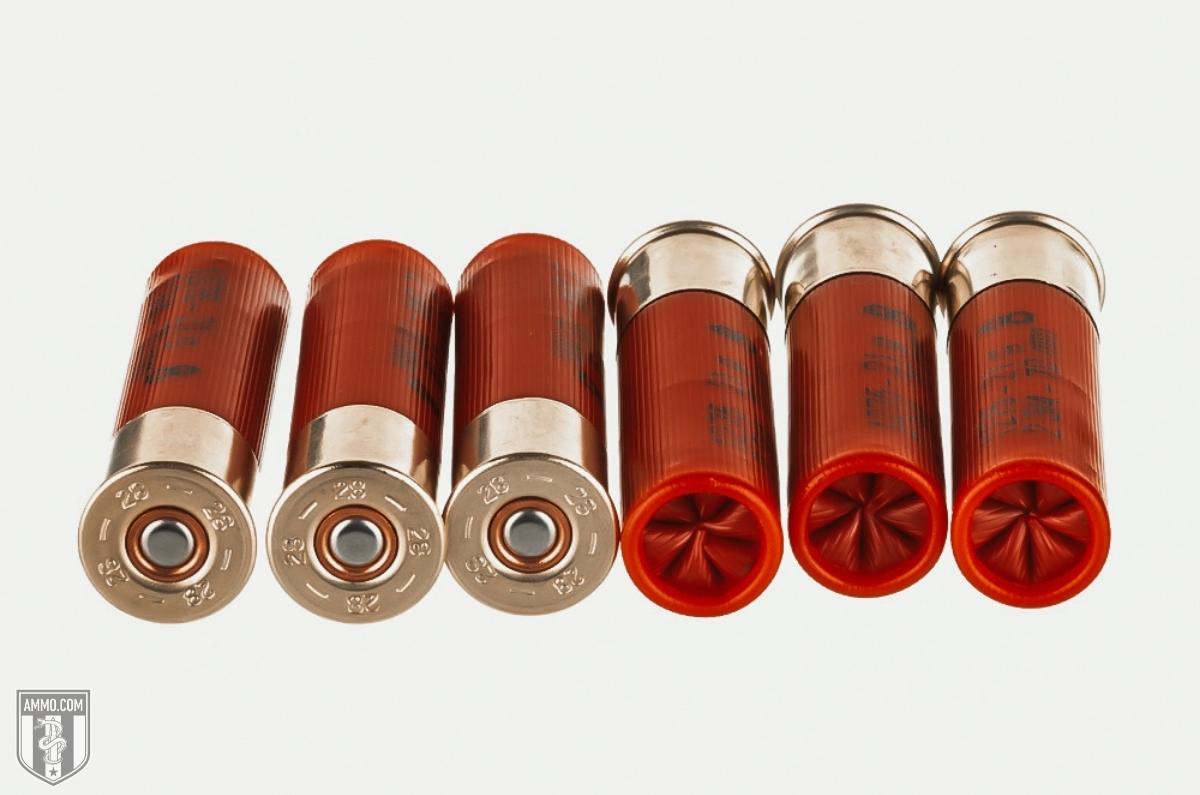
The 50 BMG's striking energy can easily be ten times more powerful than the 50 Beowulf's at the same range. There's no clearer way of saying that the 50 BMG has much more stopping power than the 50 Beowulf.
Hunting
When it comes to hunting, bigger is typically better. However, there is such a thing as overkill.
The 50 Beowulf is an excellent deer and hog hunting round out to 150 yards. The straight-walled cartridge meets the deer hunting regulations of several states, such as Ohio and Iowa.
It can ethically harvest an elk out to 100 yds, but it quickly loses its velocity and kinetic energy downrange.
The 50 BMG can ethically harvest a deer or elk at any range. It's due to destroy a lot of meat in the process, though. The 50 BMG is even considered too large for elephant hunting.
Though it's limited in its hunting abilities, the 50 Beowulf wins this category because it doesn't ruin the meat hunters are after.
50 Beowulf vs. 50 BMG for Home Defense
I'm all for knockdown power for self-defense and home defense situations. However, the 50 BMG is once again overkill.
I prefer a pistol – either a 9mm or 45 ACP – as a concealed carry firearm for self-defense. Rifles are virtually impossible to conceal, making them a poor self-defense choice. I also argue they're a less than desirable choice for home defense because rifle bullets can easily pierce multiple walls and jeopardize innocent bystanders.
I think a 12 Gauge or 20 Gauge shotgun is a better home defense weapon because you don't have to be as precise to be effective, and you don't have to worry as much about shooting through the walls of your house and hurting an innocent bystander.
With that said, if I only had a 50 Beowulf or 50 BMG to protect my family, I would use it.
Between these two rounds, I would choose the 50 Beowulf. The gun is much more manageable, it will penetrate fewer walls, and you can have more ammo in the magazine. The 50 BMG would certainly subdue a threat at close range, although its powerful recoil, deafening report, and bullet's near certainty of exiting your home all make it a subpar choice for home defense.
The 50 Beowulf wins this section.
Ammo Cost & Availability
These rounds are equally easy to find.
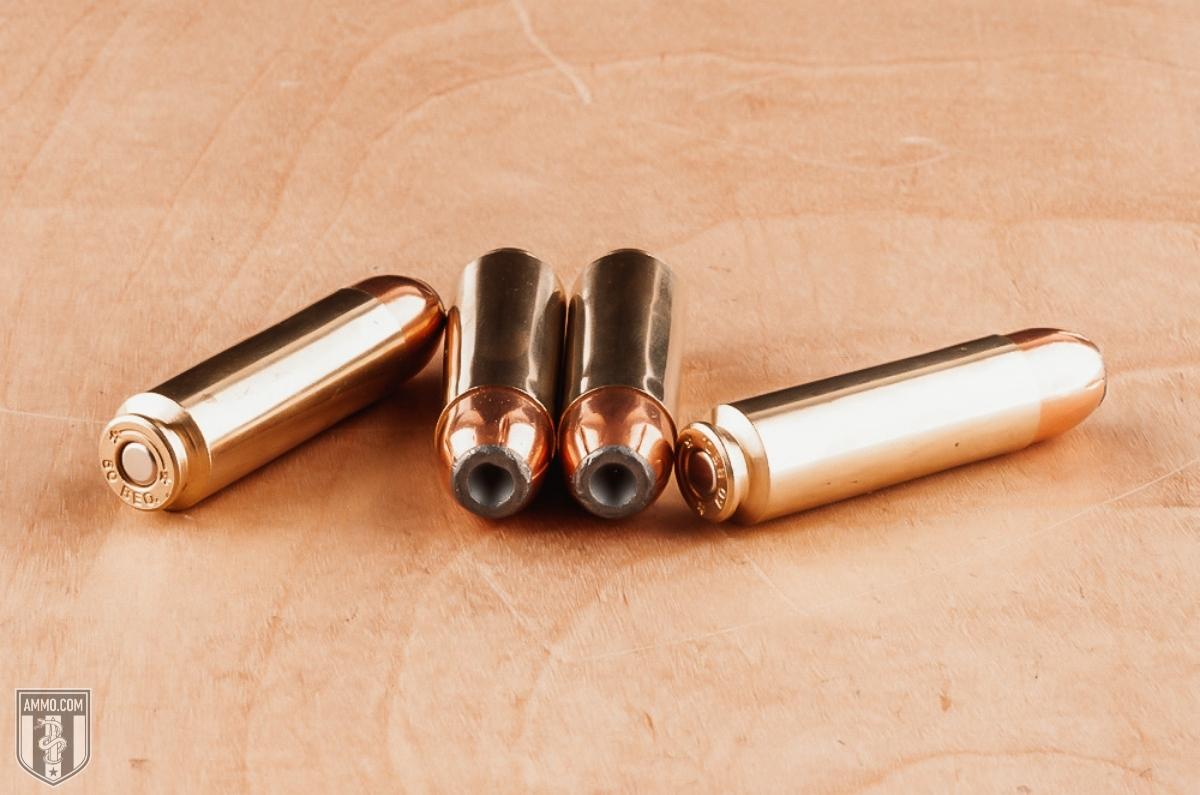
I wouldn't consider either one cheap, although the 50 Beowulf is certainly much cheaper than the 50 BMG.
An inexpensive box of 50 Beowulf will cost $1.65 per round, while the more expensive ammunition will cost $3.30+ per round.
50 BMG begins at $3.60 per round and goes up to $7.50+ for high-end match ammunition.
Unless you've got a trust fund to dip into, the 50 Beowulf is the way to go because it has cheaper ammunition.
Rifle Cost & Availability
The guns themselves are not cheap.
You substantially lower the cost of a 50 Beowulf if you already have an AR lower. A new 50 Beowulf upper and bolt assembly will cost about $500. A new complete Alexander Arms semi-auto 50 Beowulf AR costs around $2,400.
The price of 50 BMG firearms begins where the 50 Beowulf leaves off. An EDM Arms single-shot receiver costs about $2,400. You can move up to a bolt-action Bushmaster BA50 with a barrel length of 22" or 30" for $5,500. If you want one of the top-of-the-line sniper rifles, check out the Accuracy International AW50 for $12,750.
You can spend as much as you'd like on a new rifle. But if you're on a tight budget like most of us, the 50 Beowulf is the way to go.
Reloading the 50 BMG vs. 50 Beowulf
Whether you're competition shooting, hunting, or target shooting, one of the best ways to save money on ammo is to reload.
You can load up the ammo can with spent brass and reuse it a few times, plus you can get powder and bullets discounted when you buy them in bulk.
Reloading takes a lot of time, but it can be well worth the investment because you save money and have more control over the ammo-making process, which will lead to more accurate and consistent rounds.
Both rounds can be handloaded. Reloading information and equipment are readily available for both cartridges. This category is a tie for those reasons.
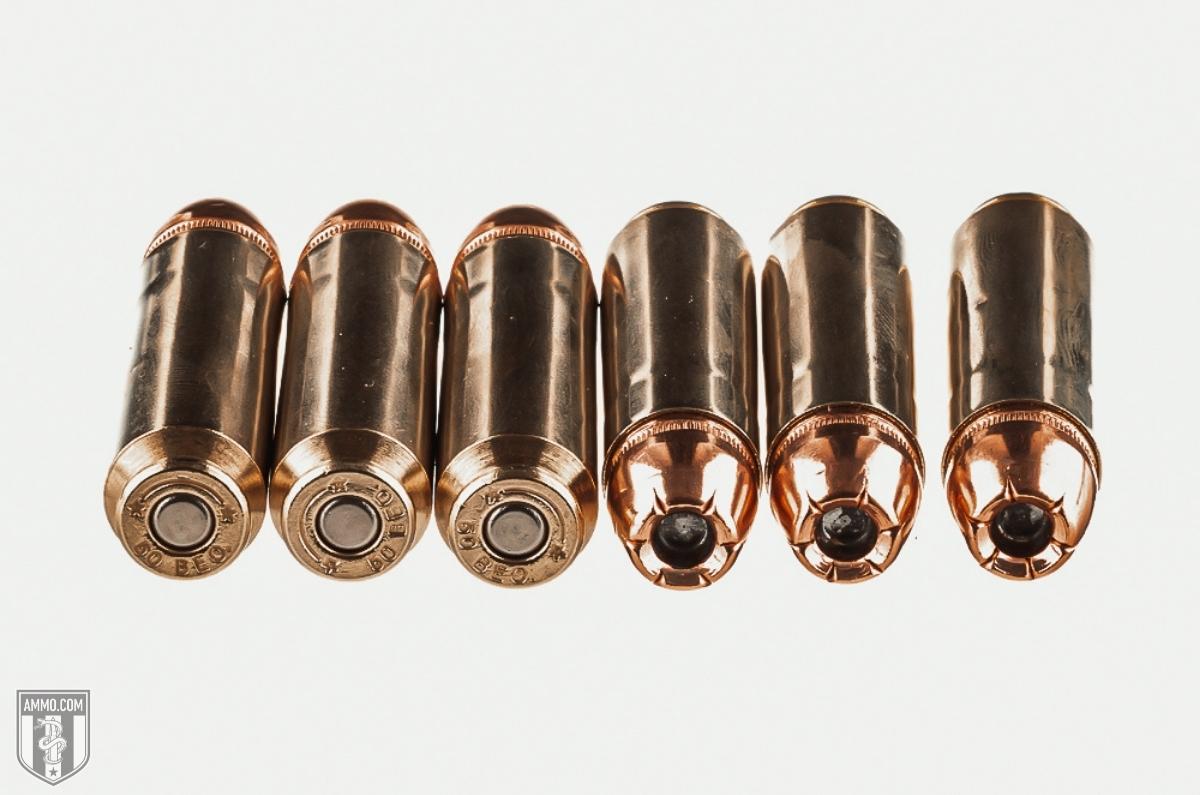
50 Beowulf vs. 50 BMG Ballistics
The ballistics of the 50 BMG and the 50 Beowulf are drastically different. Check them out below to see for yourself.
50 Beowulf Ballistics
Note: This information comes from ammo manufacturers. Actual ballistics obtained with your firearm can vary considerably from the advertised ballistics. Also, ballistics can vary from lot to lot with the same brand and type load.
| Velocity | Energy (ft-lbs) | Elevation (in.) | ||||||||||||||||||
|---|---|---|---|---|---|---|---|---|---|---|---|---|---|---|---|---|---|---|---|---|
| Bullet | Length (in) | G1 BC | 0yds | 100yds | 200yds | 300yds | 400yds | 500yds | 0yds | 100yds. | 200yds | 300yds | 400yds | 500yds | 0yds | 100yds. | 200yds | 300yds | 400yds | 500yds |
| 275gr SCHP | Unspecified | 0.141 | 2418 | 1856 | 1395 | 1088 | 936 | 839 | 3571 | 2103 | 1188 | 724 | 535 | 430 | -1.8 | 4.3 | 0.0 | -22.5 | -74.2 | -165.5 |
| 300gr FTX | 12 | 0.200 | 1695 | 1384 | 1151 | 1010 | 920 | 852 | 1914 | 1276 | 883 | 680 | 564 | 484 | -1.8 | 8.3 | 0.0 | -34.4 | -102.9 | -212.3 |
| 350gr XTP | 16 | 0.145 | 1830 | 1385 | 1089 | 940 | 844 | 769 | 2603 | 1492 | 922 | 686 | 554 | 460 | -1.8 | 8.3 | 0.0 | -37.5 | -114.3 | -239.9 |
50 BMG Ballistics
Note: This information comes from ammo manufacturers. Actual ballistics obtained with your firearm can vary considerably from the advertised ballistics. Also, ballistics can vary from lot to lot with the same brand and type load.
| Velocity | Energy (ft-lbs) | Elevation (in.) | ||||||||||||||||||
|---|---|---|---|---|---|---|---|---|---|---|---|---|---|---|---|---|---|---|---|---|
| Bullet | Length (in) | G1 BC | 0yds | 100yds | 200yds | 300yds | 400yds | 500yds | 0yds | 100yds. | 200yds | 300yds | 400yds | 500yds | 0yds | 100yds. | 200yds | 300yds | 400yds | 500yds |
| 660gr FMJBT | 36 | 0.701 | 2950 | 2815 | 2685 | 2558 | 2434 | 2341 | 12756 | 11616 | 10563 | 9588 | 8685 | 7850 | -1.8 | 1.3 | 0.0 | -6.1 | -17.6 | -34.9 |
| 750gr A-MAX | 36 | 0.1050 | 2815 | 2727 | 2641 | 2557 | 2474 | 2393 | 13196 | 12386 | 11619 | 10889 | 10196 | 9538 | -1.8 | 1.4 | 0.0 | -6.4 | -18.2 | -35.6 |
History of the 50 Beowulf
The story of the development of the 50 Beowulf isn't well known because Bill Alexander, the owner of Alexander Arms, prefers to keep company matters private.
Here's what is known about the semi-automatic rifle cartridge's origin.
The 50 Beowulf was developed from the same parent cartridge as the 458 SOCOM – the 50 Action Express – which is the primary chambering of the Desert Eagle.
The 50 Beowulf is essentiallu a lengthened version of the 50 AE handgun cartridge. It was released to the public in 2001 as a harder-hitting alternative to the 5.56, and is now primarily used by deer and hog hunters.
History of the 50 BMG
The development of the 50 BMG goes back many more years, and it is much more well known than the 50 Beowulf.
The idea for the .50 Browning came to the U.S. Army during World War I and was inspired by Germany's Mauser 13.2mm TuF.
The round gets its name from John Moses Browning, who had been tasked by the Army with making a machine gun capable of downing aircraft.
The Army then went to Winchester Arms for the ammunition. Winchester recruited Frankfort Arsenal. scaled up the .30-06 case, and loaded it to the max.
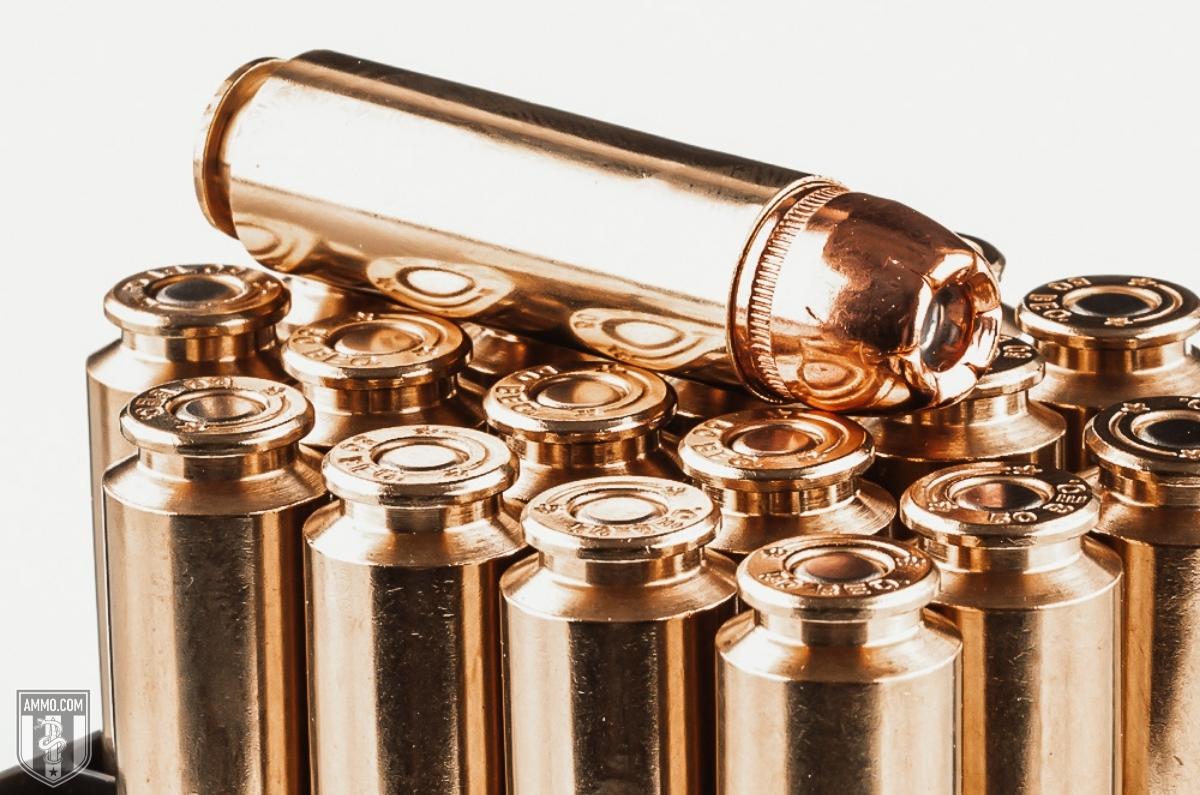
The 50 BMG is primarily used by the military, with a few law enforcement agencies using sniper rifles chambered for it as well.
Long-range shooting enthusiasts also use it for competitions and target shooting.
Parting shots
These two cartridges are as different as they come, yet both have their place.
For the general public, the 50 Beowulf will be the better purchase because it can be used for hunting, has less recoil, and is much less expensive to shoot.
However, if you're a long-range shooter, then the 50 BMG is what you need since it has a flatter trajectory and incredible long-range capabilities.
When comparing 50 Beowulf vs. 50 BMG, it comes down to your intended purposes because these rounds are not as similar as their names suggest.
Ammo Comparisons
- .308 vs 5.56
- 6.5 Creedmoor vs .308
- .300 Blackout vs .308
- .300 Win Mag vs .308
- .243 vs .308
- .308 vs .30-06
- 7mm-08 vs .308
- .270 vs .308
- 7.62x39 vs .308
- .223 vs .308
- .338 Lapua vs .308
- .380 ACP vs 9mm
- .223 vs 5.56
- .300 Blackout vs 5.56
- 9mm vs 45 ACP
- 9mm vs 40 S&W
- .357 SIG vs 9mm
- 10mm vs 9mm
- 9mm vs 9mm Luger
- .243 vs .270
- .300 Win Mag vs .30-06
- .270 vs .30-06
- .40 vs .45
- 38 Special vs 357
- 9mm vs 40 vs 45
- 5.56 vs 7.62x39
- 338 Lapua vs .30-06
- .30-30 vs .30-06
- 300 PRC vs 338 Lapua
- .30-06 vs 7mm
- 300 Win Mag vs 338 Lapua
- 300 PRC vs 300 Win Mag
- 300 WSM vs 300 Win Mag
- 338 Win Mag vs 338 Lapua
- 12 Gauge vs 20 Gauge
- 10mm vs 357 Mag
- .30-30 vs 7.62x39
- 224 Valkyrie vs 22-250
- 17 HMR vs 22 Mag
- 7.62x39 vs .300 Blackout
- 45 ACP vs 45 Auto
- 45-70 vs 30-30
- 300 Blackout vs 223
- 357 Magnum vs 9mm
- 350 Legend vs 300 Blackout
- 224 Valkyrie vs 223
- 45 ACP vs 38 Super
- 6.5 Grendel vs .308
- 17 HMR vs 22 LR
- 10 Gauge vs 12 Gauge
- 22-250 vs 223
- 45 Colt vs 45 ACP
- 350 Legend vs 30-30
- 5.7x28 vs 223
- 5.7 vs 9mm
- 5.56 vs 5.7
- 22 vs 9mm
- Buckshot vs Birdshot
- 450 Bushmaster vs 308
- 450 Bushmaster vs 223
- Buckshot vs Slug
- 6.5 Grendel vs 5.56 vs 223
- 6mm ARC vs 6.5 Grendel
- 44 vs 45
- 458 SOCOM vs 5.56
- 357 vs 44
- 32 ACP vs 380
- 300 Win Mag vs 338 Win Mag vs 338 Lapua Mag
- 450 Bushmaster vs 458 SOCOM vs 50 Beowulf
- 6mm Creedmoor vs 6.5 Creedmoor
- TMJ vs FMJ
- 44 Special Vs 44 Magnum
- 45 90 vs 45 70
- 6.8 Western vs 6.8 SPC
- 50 Beowulf vs 50 BMG
- 26 Nosler vs 6.5 PRC
- 28 Gauge vs 410
- 6.8 SPC vs 5.56
- 6.8 SPC vs 6.5 Grendel
- 6.8 Western vs 7mm Rem Mag vs .28 Nosler
- 6.8 Western vs 6.5 Creedmoor
- 22 Hornet vs 223
- 6.8 Western vs 6.5 PRC
- .410 vs 12 Gauge
- .410 vs 20 Gauge
- 22 LR vs 22 Mag
- 6mm ARC vs 243
- 7mm-08 vs 270
- 243 vs 6.5 Creedmoor
- Nickel vs Brass Casing
- 204 Ruger vs 223
- 50 Beowulf vs 5.56
- 260 Remington vs 6.5 Creedmoor
- 6mm Remington vs 243
- 28 Nosler vs 300 PRC
- 50 Beowulf vs 50 AE
- 22 Nosler vs 22-250
- 450 Marlin vs 45-70
- 300 Win Mag vs 300 Norma
- 458 SOCOM vs 300 Blackout
- 38-55 vs 45-70
- 22 Hornet vs 22 LR
- 300 Norma vs 338 Lapua
- 338 Lapua vs 50 BMG
- 28 Nosler vs 300 Win Mag
- 28 Nosler vs 6.5 Creedmoor
- 204 vs 22-250
- 458 SOCOM vs 45 70
- 44 40 vs 45 70
- 6.8 SPC vs 6.5 Creedmoor
- 450 Bushmaster vs 30-06
- 7mm Rem Mag vs 300 Win Mag
- 30 Carbine vs 223
- 25-06 vs 30-06
- 26 Nosler vs 28 Nosler
- 16ga vs 12ga
- 30 06 vs 7.62 x54R
- 9mm Makarov vs 9mm Luger
- 350 Legend vs 223
- 30 Carbine vs 5.56
- 6.5x55 vs 6.5 Creedmoor
- 6.5 Creedmoor vs 270 vs 25-06
- M193 vs M855
- 450 Bushmaster vs 458 SOCOM
- 6.5 Grendel vs 6.5 Creedmoor
- 350 Legend vs 5.56
- .277 Fury vs 6.8 SPC
- 277 Fury vs 300 Win Mag
- 10mm vs .45 ACP
- 277 Fury vs 223
- 6.8 SPC vs 300 Blackout
- 6.5 PRC vs 6.5 Creedmoor
- 277 Fury vs 308
- 277 Fury vs 6.5 Creedmoor
- 350 Legend vs 450 Bushmaster
- 277 Fury Vs 5.56 NATO
- 10mm vs 40S&W
- 32 ACP vs 9mm
- 32 Special vs 9mm
- 8.6 Blackout vs 300 Blackout
- 30 Super Carry vs. 9mm
- 5.56 vs 9mm
- .50 Action Express vs 9mm
- 7.62x25 vs. 9mm
- 10mm vs 44 Magnum
- 300 Blackout vs 300 Win Mag
- 6.5 Grendel vs 300 Blackout
- 460 Rowland vs 10mm
- 300 RUM vs 300 PRC
- 300 Norma vs 300 PRC
- 45 GAP vs 45 ACP
- 7mm PRC vs 300 Win Mag
- 300 PRC vs 6.5 Creedmoor
- 300 PRC vs 308
- 357 SIG vs 357 Mag
- 7.62x39 vs 7.62x51
- 243 Win vs 223 Rem
- 30 Nosler vs 300 PRC
- 6.5 Creedmoor vs. 30-06 Springfield
- 450 S&W vs. 44 Magnum
- 6.5 Creedmoor vs. 300 Win Mag
- 454 Cassull vs. 45-70 Govt
- 454 Cassull vs. 44 Mag
- 7.62x54r vs. 308 Winchester
- 22 ARC vs. 223 Rem
- Subsonic vs. Supersonic Ammo
